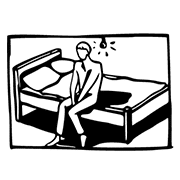Traumasensitive Couples
- Home
- »
- Traumasensitive Couples
Appointment requests
I can support you in my practice or online. In all cases personally and individually.
Monday to Friday, from 09:00 to 19:00
Help for trauma sensitive couples
Trauma sensetive couples get into repeated violent arguments, which often escalate into dramatic fights. These fights can manifest themselves as a sexual conflicts and are often caused by traumatic experiences in childhood. Physical abuse, emotional and physical neglect, mentally ill parents, drug abuse and alcohol problems in the family are all part of the story of such couples. Fighting parents, the loss of a parent through death, separation, or illness can all lead to an attachment trauma. This wound is then carried into the partnership and puts a heavy strain on the relationship.
In order to get out of this crisis, separation often seems to be the only solution. However, when we study the repetitive nature of these disputes together, we see that there is a way out.
My support
Many couples quarrel violently for trivial reasons and do not understand themselves why an event triggers a violent reaction. As a rule, it is not due to current events, but to something that happenned in the past that has been compartmentalised. The trigger sets of a kind of flashback to which the person reacts.
My task is to find the real background behind disputes. In my psychotherapeutic practice in Mainz, I try to find out more about your past life through analysis. In doing so, I also focus on experiences that lead to a stimulus triggering a certain reaction. By tracking down personal traumas, it is possible to alleviate problems in the partnership.
Your topics
Appreciation, understanding and acceptance of people who seek help.
Our way
First of all, it is important to understand reactions. If you understand why one or the other partner is reacting so severely, it becomes easier to cope with the situation. In cases where there is physical or emotional violence, I can equip you with methods that avoid escalations.
In the initial trauma therapy, flashbacks may intensify until the experience is completely processed.
I advise both partners to take part in the therapy. This also applies in couples where one partner is not traumatised.
Contact me
Contact me now by e-mail or phone and tell me about your concerns. If I am not available, I will get back to you immediately and we can schedule an appointment for an initial consultation. As self paying clients, you can decide on the frequency and timing of the sessions.
Initial consultation
In an initial consultation, both partners have time to describe their situation. Most couples take 6-10 sessions to arrive at new agreements Initially, we may meet every 2 weeks. Then the intervals can be longer. Many couples return to me for a couple of sessions year after year.
Each session lasts 60-90 minutes, during which we take time to create a new experience.
Couple therapy
Couple therapy is based mainly on systemic humanistic and family therapy theories. I always allow my strong intuition to adapt to your individual needs.
An in-depth psychological approach is especially important with trauma-sensitive couples.

I will help you to overcome fears and obstacles in your life.
I am
alternative practitioner for psychotherapy
My expertise is to help you cope with personal problems, psychological load, stress and burnout.
My wish is to harmonise your feelings with your thinking and the actions you take.
My work applies a solution focused approach.
Your questions about dew-sensitive couples
Never fall into the perpetrator-victim-rescuer triangle. You are a person with your own needs and desires. It is not your job to save the other person, and it is not your fault if they react violently by doing something that reminds them of the trauma. Many relationships fail because one partner sees the other as a victim and unconsciously makes himself the perpetrator who is responsible for the violent reactions.
Traumatized people are usually overexcited, very nervous and jumpy. Impatience, irritability and a constantly bad mood are other signs. Traumatized people often appear emotionally cold. They tend to have great feelings of shame and guilt and suffer from low self-esteem.
A traumatized person lives with the constant expectation that suffering, once inflicted, will happen again. For this reason, he does not realistically perceive the behavior of his partner. He relates it to himself and interprets it from the perspective of his own trauma. Even your most considerate and understanding behavior will not change anything.










